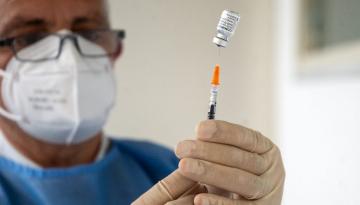The head of New Zealand's managed isolation and quarantine (MIQ) system is pleased with the uptake of the COVID-19 vaccine to date.
MIQ and other border staff were first in line for New Zealand's vaccine rollout, being most at risk of contracting the SARS-CoV-2 virus and passing it onto others in the community.
That risk appears to have been dramatically reduced - three weeks in, 83.6 percent of them have received the first dose of the Pfizer/BioNTech vaccine - about 12,700 people.
"These workers are our frontline defence against COVID-19 - every day that they go to work, they put themselves between us, the community, and the virus," Brigadier Jim Bliss, head of MIQ, told Newshub.
"There's been a really strong uptake from all of our workers and their families. We recognise that some people might have been initially reluctant to have the vaccine, wait it out a bit... maybe do a bit more reading and understanding of the literature. But we've only been going three weeks, and to have 84 percent of the staff vaccinated is really positive."
RNZ reported 21 have proactively refused to be vaccinated.
New data out of Israel, which has implemented the world's fastest rollout of the Pfizer vaccine, suggests not only does it cut infection - symptomatic or asymptomatic - but it also drastically reduces transmission, something that wasn't clear in the vaccine's trials.
While one dose offers some protection, the Pfizer vaccine works best with two - staff who've already had one dose will start getting their second next week.
"Towards the end of April, we expect the majority of our workforce to be vaccinated," said Bliss.
More than 120,000 people have entered New Zealand through MIQ.
People MIQ workers live with are now getting their first jabs.
"That's an estimated 50,000 people and is a critical additional line of defence to keep them, their whānau and our communities safe and well, and help prevent COVID-19 from spreading into our communities," said Bliss.
For those on the frontline who have refused the vaccine, Bliss hopes more education and information about its safety and effectiveness will convince them to sign up.
"Secondly there's a discussion that we're having with employers and the unions to better-inform them so that they can discuss with their workforce what the next process step would be for a worker, should they choose not to have the vaccine - which is their right."
Bliss told RNZ some frontline workers might have to be "redeployed" if they refuse the vaccine.
The Pfizer vaccine was one of four the Government signed deals for - initially purchasing enough for 750,000 people - but earlier this week announced it had bought more, enough for everyone in the country. COVID-19 Response Minister Chris Hipkins said using just one vaccine would make the rollout more streamlined.



